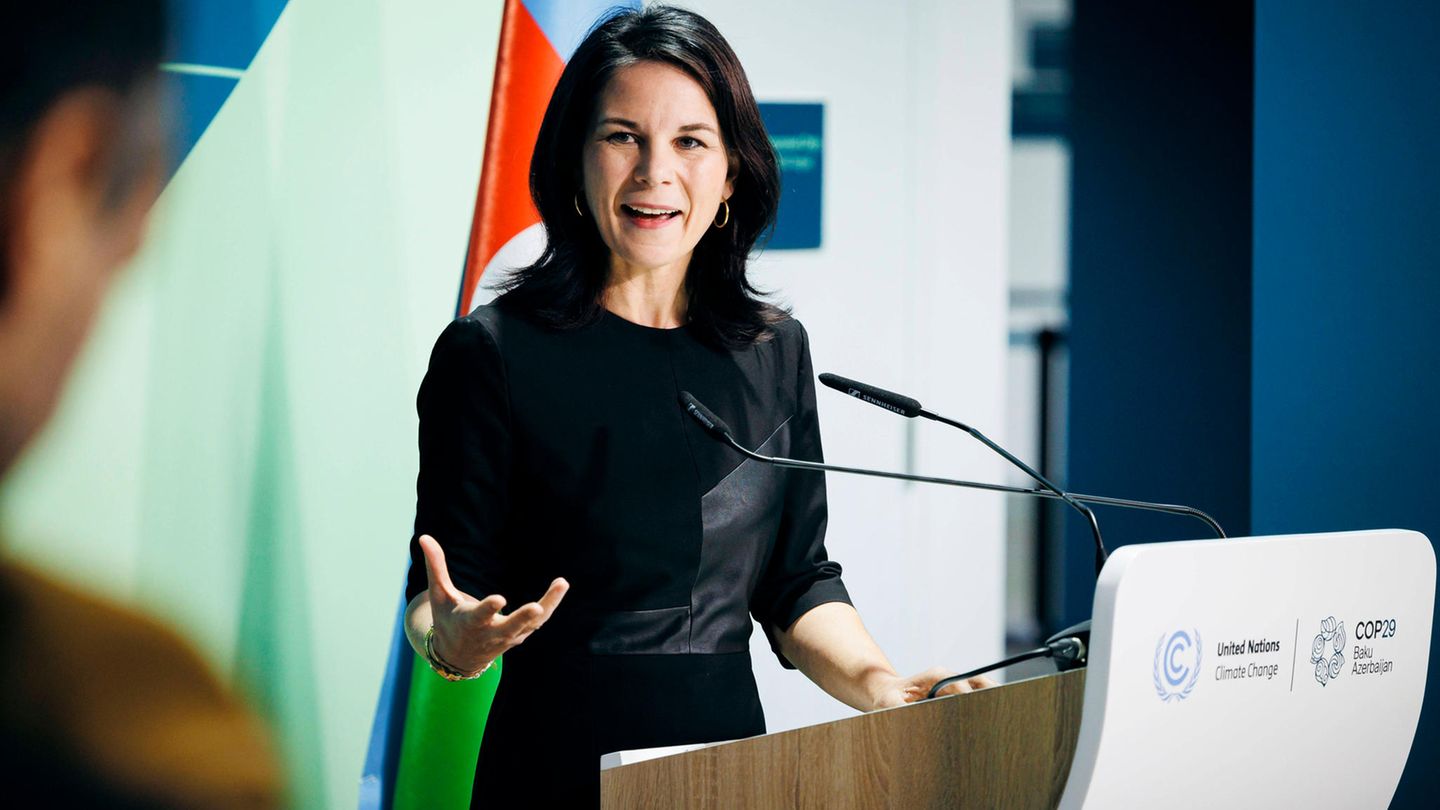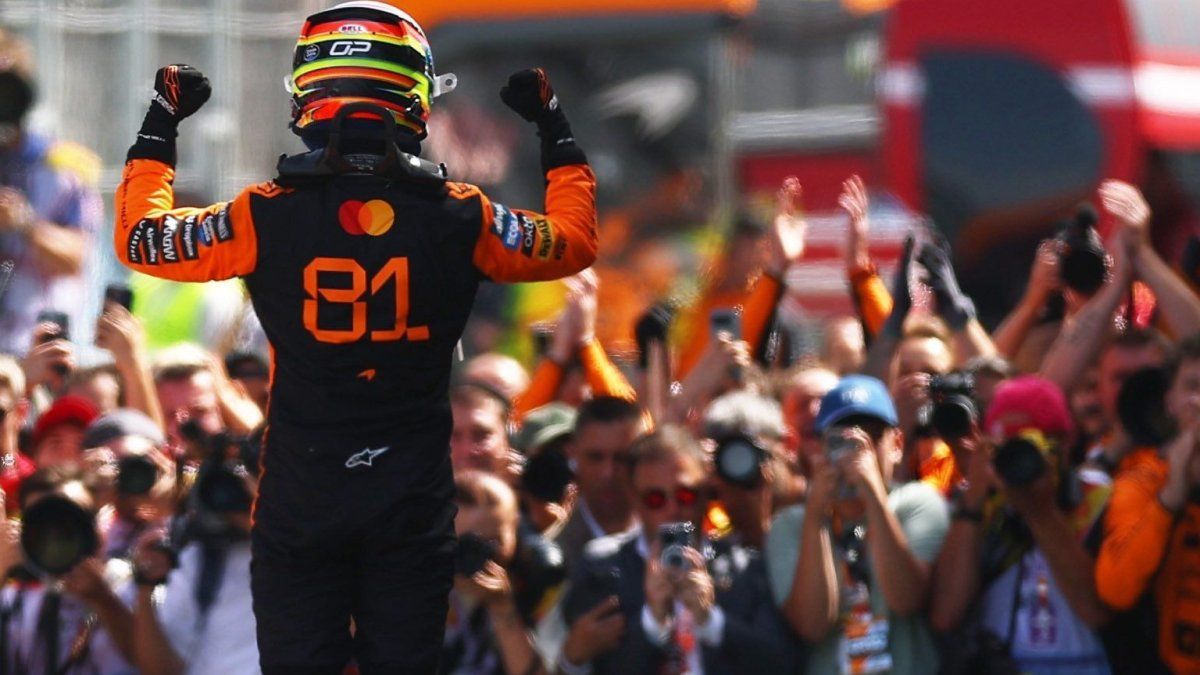COP29
Agreement in Baku on higher climate financing – there is still criticism
Copy the current link
COP29 has come to an end in Baku. Despite an agreement between the states, many participants are dissatisfied. This also applies to Annalena Baerbock, who criticizes the “resistance of a few”.
After a tough struggle, the UN Climate Change Conference decided on a new framework for international financing of climate protection and adaptation to climate impacts on Sunday night. Accordingly, the annual contribution, primarily from industrialized countries, should be increased to at least $300 billion by 2035. However, developing countries criticized this as inadequate. There was also criticism of the lack of new resolutions to move away from fossil fuels and reduce greenhouse gas emissions.
COP29: Developing countries make demands
The financial resolution fell far short of demands from developing countries, but represents a tripling of the current $100 billion annual commitment. During the conference, developing countries called for contributions of $1.3 trillion annually until 2035, and at least an increase in contributions from industrialized countries to $500 billion by 2030.
The sum of 1.3 trillion dollars is now mentioned in the resolution as a target, but without further information on the source of the funds. However, a process was decided on, the “Baku to Belem roadmap”, to explore options for this. The COP30 will take place next year in Belém, Brazil.
Industrialized countries had also called for the inclusion of economically strong emerging countries such as China. This was successful to a limited extent: developing countries, which formally include China, are now “encouraged” to make contributions “on a voluntary basis.”
Sebastian Copeland’s best pictures of the Arctic – touching and depressing
Husky Zephyr accompanied Copeland to Otto Fjord on Ellesmere Island to protect himself from polar bears. A chance shot, the researcher actually wanted to photograph the melting iceberg in the background
© Sebastian Copeland
Countries are leaving the negotiations in protest
During the conference there was repeated strong criticism of the actions of the Azerbaijani presidency. Representatives of particularly vulnerable countries such as small island states occasionally left the negotiations in protest.
After the decision, Indian negotiator Chandni Raina made serious allegations. The amount mentioned in the decision was “abysmal” and “paltry,” she said. Representatives of Cuba and Bolivia as well as other developing countries also sharply criticized the decision. The group of African negotiators said the agreement was “too little, too late” for their continent. “We are extremely disappointed by the lack of progress on issues important to Africa,” said chief negotiator Ali Mohamed.
UN Climate Secretary Simon Stiell admitted that the decision was no reason to celebrate victory. “No country got everything they wanted,” he said. Nevertheless, “a new era” begins with the decision.
German Foreign Minister Annalena Baerbock (Greens) also spoke of entering a new chapter in climate financing. She responded to criticism from developing countries by saying that there was now at least “a starting point”.
Joe Biden praises agreement
The support now planned “does not meet the growing needs of low-income countries in the fight against the climate crisis,” criticized Jan Kowalzig from Oxfam. In order to prevent the conference from failing, the most vulnerable states “supported a result that did not meet their needs at all,” said Sabine Minninger from Bread for the World.
Eating better for the climate: These five nations show how it can be done

Venezuela: mussels, mussels, mussels
They are rich in protein as long as they come from clean waters. Because mussels filter the water in which they grow. Because mussels feed on phytoplankton, they only need a fraction of the ecosystem to produce their protein. No other animal protein is more sustainable.
US President Joe Biden praised the financing agreement as a “significant step”. He called the funding goal “ambitious.” Against the backdrop of the upcoming change of administration in Washington, Biden said that “no one” can undo the “clean energy revolution”.
A confirmation of the groundbreaking decisions of the previous conference in Dubai to move away from fossil fuels and triple the use of renewable energies by 2030 was not achieved in Baku. According to a draft resolution, there should only have been a discreet reference to these resolutions.
Baerbock is dissatisfied
However, the delegations of Chile, Canada and Switzerland objected to this – there was talk of a “step back”. The small island states said that the proposal “does not do justice to the reality of the climate crisis.” The relevant draft resolution on the “United Arab Emirates Dialogue on the Global Stocktaking” was then postponed until next year.
Heat, heavy rain, floods: Europe is experiencing a June of extremes

Greece is groaning under maximum temperatures
Athens, Greece. A heat wave has been making life difficult for people in Greece and Turkey for days. Temperatures of up to 45 degrees were expected on the Peloponnese peninsula. The Acropolis was closed to the public for hours because of the heat
© Petros Giannakouris / AP / DPA
Baerbock admitted that the results from Baku were “not enough” with a view to achieving the 1.5 degree target. The reason for this is the “resistance of a few”. The minister had previously criticized “power games” by oil and gas states, which also had the backing of the Azerbaijani presidency.
“It is scandalous that the oil and gas lobby, with the help of some oil states in cooperation with the gas sponsor country, has managed to block all the necessary accelerations to phase out coal, oil and gas,” explained Martin Kaiser from Greenpeace.
The conference ended early on Sunday morning, around a day and a half late.
AFP
ls
Source: Stern
I have been working in the news industry for over 6 years, first as a reporter and now as an editor. I have covered politics extensively, and my work has appeared in major newspapers and online news outlets around the world. In addition to my writing, I also contribute regularly to 24 Hours World.




